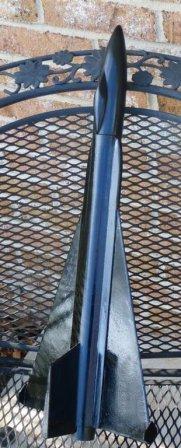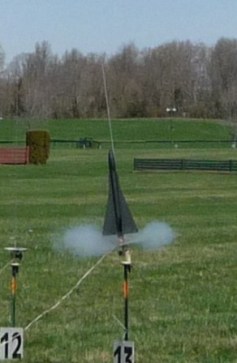Brief:
 This is sport scale model of an X-15 variant proposed by North American Aviation. More accurately, it is fantasy scale since this stretched, delta-winged version was never produced. Like the other offerings from Hostile Projectiles, this kit features a hand-crafted resin nose cone. It flies on 24mm power.
This is sport scale model of an X-15 variant proposed by North American Aviation. More accurately, it is fantasy scale since this stretched, delta-winged version was never produced. Like the other offerings from Hostile Projectiles, this kit features a hand-crafted resin nose cone. It flies on 24mm power.
Construction:
Parts Included:
- Resin nose cone
- 16" BT-60 body tube
- 24mm motor mount (tube, block, hook, and two CRs)
- Two large 1/8" balsa wings
- Balsa for stabilizers (two 1/16" sheets, four 1/2" x 1/16" strips)
- Four pieces of balsa edge stock for the wing strakes
- Two 1/8" launch lugs
- Styrene tube and screw eye for nose cone attachment
- Elastic shock cord
- 'Trash bag' 'chute, string and adhesive tabs
- Decal sheet, templates, instruction CD
Parts I Added
- Kevlar leader to extend the provided shock cord.
- Lead shot and epoxy nose weight.
- An 18" nylon 'chute.
- 1/64" fiberglass for the tail cone.
This kit is called a 'garage kit' aka a 'builders kits'. There is no header card or print instructions. The latter comes on CD an includes the instructions in both .doc and .pdf formats, a copy of the fin template, and a graphic that you can use to make decals. The instructions are not polished but are written in a humorous manner, which made the kit even more entertaining. The tubes are not a cleanly cut as some others, there are no laser cut fins, and the 'chute is plain trash bag plastic.
The assembly of the Delta X-15 is a little more complicated that your typical 3/4FNC rocket, with the complexity being in forming the strakes that run along the main wings and in assembling the stabilizers.
 The first step is to remove the mould release from the nose cone. I scrubbed it with steel wool, dish washing soap, and hot water. When I thought I scrubbed enough, I scrubbed some more. After the primer didn't stick well to my Hostile Projectiles V-2 cones, I sanded this one and scrubbed some more.
The first step is to remove the mould release from the nose cone. I scrubbed it with steel wool, dish washing soap, and hot water. When I thought I scrubbed enough, I scrubbed some more. After the primer didn't stick well to my Hostile Projectiles V-2 cones, I sanded this one and scrubbed some more.
The instructions show you how to ream the cockpit windows, which are to be plugged with scrap clear plastic (builder-provided). I chose not to do this. The alternate method is to paint them and cover with a thin layer of epoxy. The next step on the cone is to glue the styrene tube to the wall of the cone and then the screw eye into that tube. I did so with 5-minute epoxy. I later added lead shot and epoxy to move the loaded CG to about 12.5 inches from the nose cone tip.
I prepped the large, pre-cut wings by laminating them with printer paper using 3M Super 77 glue. I saw a flight report where the wing broke and I thought this would make them a little tougher. This worked out OK (based on my level of acceptability), but barely so. I need more practice on larger fins. 'Nuff said.
The edge stock, which is tapered along its short axis, is glued to the root of the wings. Since these strips are longer than the wing, you fill the leading edge gap with scrap balsa taken from the leftovers from the stabilizers. Once filled in, this section of the wing assembly is shaped using a provided template.
The motor assembly is standard, consisting of a tube, a motor hook, a motor block, and two laser cut centering rings. I augmented the recovery harness by adding a length of Kevlar, which was fed through a notch I made on the top CR. I built the mount with wood glue and a dab of 5-minute epoxy to attach the Kevlar leader.
When I went to mark the body tube using the provided marking guide, I found that it was a bit small. I had to adjust each mark by about 1/16". I also noted that the pre-cut pieces of 1/2"-wide stock that is used for the rear of the delta-shaped stabilizers were about 1/8" too long. Thus, I suspect the span of said stabilizers is also a skosh shorter than intended. I'll double check that my RockSim model has the as-built dimensions. Other than that, framing the delta shaped stabilizers was straightforward. 
I mounted the provided lugs on the bottom at the joint between the body and one lower fin strake. I also mounted some 3/16" lugs on the opposite strake.
The final step was to form the tail cone. I tried a couple of paper varieties and wasn't happy. I ended up cutting mine from 1/64" fiberglass.
Finishing:
The instructions provide detailed finishing recommendations, including Minwax wood filler, Bondo spot putty, and Tamiya paint. However, I used fill'n'finish and Rustoleum primer and paint. The wings didn't require filing as they were laminated with paper.
The kit comes with a plenty of decals. The instructions said they were pre-coated but an insert in the bag that held the decal sheet said the builder had to do so. It suggested Testor's sealer but I decided to try Future. This was a mistake as the Future totally melted and ran the colors. Steve provides an image that you can use to print another set and in an email recommended Experts Choice paper. If I couldn't find it locally he offered to provide a replacement set even though I didn't follow simple directions.
I can't fault the kit for the label disaster and providing the decal image is a real plus. Such is the benefit of providing soft copy instructions.
In any event, my will fly decal-free.
Construction Rating: 3 out of 5
 Flight:
Flight:
Prep was typical, including a mix of paper and cellulose wadding and some masking tape to make the cone snug. I chose a D12-5 for the first flight. The boost was perfectly straight and ejection was at apogee. Very nice.
Recovery:
The rocket recovered under an 18" nylon 'chute. I has expected to snap one of the tip winglets off but, nope, it recovered perfectly.
Flight Rating: 5 out of 5
Summary:
This is a cool looking kit that is sure to get attention on the field. As I mentioned earlier, it is considered a 'garage' kit. The instructions are not refined and some of the parts are rough. I could accept that, but I found the error in the scale of the provided templates to be troubling. The main plus is the beautiful nose cone. This, along with the fact that it is such a unique subject, make the kit well worth the price. However, it is not for the novice builder and you need to take care as you assemble it.
Overall Rating: 4 out of 5

 This is sport scale model of an X-15 variant proposed by North American Aviation. More accurately, it is fantasy scale since this stretched, delta-winged version was never produced. Like the other offerings from Hostile Projectiles, this kit features a hand-crafted resin nose cone. It flies on 24mm power.
This is sport scale model of an X-15 variant proposed by North American Aviation. More accurately, it is fantasy scale since this stretched, delta-winged version was never produced. Like the other offerings from Hostile Projectiles, this kit features a hand-crafted resin nose cone. It flies on 24mm power. The first step is to remove the mould release from the nose cone. I scrubbed it with steel wool, dish washing soap, and hot water. When I thought I scrubbed enough, I scrubbed some more. After the primer didn't stick well to my Hostile Projectiles V-2 cones, I sanded this one and scrubbed some more.
The first step is to remove the mould release from the nose cone. I scrubbed it with steel wool, dish washing soap, and hot water. When I thought I scrubbed enough, I scrubbed some more. After the primer didn't stick well to my Hostile Projectiles V-2 cones, I sanded this one and scrubbed some more.
 Flight:
Flight:


